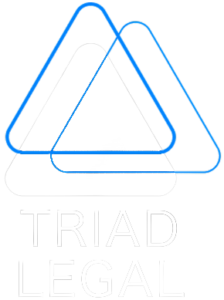TRIAD LEGAL
Murder Defense Attorney
Murder Charges
Wichita, KS Murder Defense Attorney | Your Defense Starts Here
Are You or a Loved One Facing Murder Charges?
Being accused of murder is an unimaginable ordeal, often leaving both the accused and their family searching for answers, overwhelmed by fear and uncertainty. What happens next? Will you get a fair trial? How can you protect your rights and future? These questions are just the beginning of a long, emotional, and complex legal process. At Triad Legal, we understand how high the stakes are—for the accused and their loved ones. Our compassionate, skilled murder defense attorneys in Wichita, KS are here to fight for you every step of the way.
Kansas Murder Laws
Understanding Murder Charges in Kansas
Murder is considered the gravest criminal charge in Kansas, and for good reason. This charge fundamentally accuses someone of taking another person’s life. But Kansas law divides murder into different levels based on intent, circumstances, and more.
What Are the Types of Murder Charges in Kansas?
First-Degree Murder
1
This involves intentional killing with premeditation or occurring during certain dangerous felonies (e.g., robbery, kidnapping). Potential penalties include life imprisonment without parole or even the death penalty.
Second-Degree Murder
2
A less severe charge that could stem from intentional killing without premeditation or reckless actions leading to death. Penalties range from 12½ to 54 years in prison depending on circumstances.
Manslaughter
3
Charges like voluntary manslaughter (heat-of-passion killings) or involuntary manslaughter (deaths caused by reckless negligence) carry lesser penalties but still have a significant impact on your life.
It’s worth noting that lesser charges, such as vehicular homicide, may apply in cases involving vehicles but without the recklessness required for manslaughter.
Severe Penalties
Penalties for Murder in Kansas Are Severe
The potential consequences of a murder conviction go beyond prison time. The social, emotional, and financial impacts are life-changing for you and your loved ones.

Penalty Overview:
First-Degree Murder
llegations of unwanted sexual touch or intent to satisfy sexual desires.
- Life imprisonment without parole (or with parole eligibility after 25 or 50 years).
- Death penalty in extreme cases.
Second-Degree Murder
- 12½ to 54 years in prison.
Manslaughter
- Penalties vary, but typically involve significant prison time and fines.
Our priority is to minimize, or altogether eliminate, these consequences for our clients.
What Happens After You’re Charged with Murder?
Having murder charges brought against you sets off a long legal process that can be difficult and intimidating for you and your family.
Key Steps in a Murder Case:
Arrest and Charges
After your arrest, you will face an initial hearing where you learn about the charges against you.
Preliminary Hearing
Here, a judge decides if there’s enough evidence for a trial.
Arraignment
At this stage, you enter your plea (not guilty, guilty, or no contest).
Trial Preparation
This phase involves gathering evidence, consulting witnesses, and crafting your defense strategy.
Trial and Verdict
If no plea agreement is reached, the case goes to trial, where your attorney fights to protect your rights and argue for your innocence.
With Triad Legal by your side, you’re never in this alone. We’ll help you understand each step and advocate fiercely on your behalf.
Attorney Assistance
How Can a Wichita Murder Defense Attorney Help You?
Facing murder charges without legal representation isn’t just risky—it’s life-changing in the worst way. With the stakes so high, you need more than just a lawyer; you need a dedicated partner in your fight for justice.

What We Do:
Challenge the Evidence
From unreliable eyewitnesses to mishandled forensic evidence, we scrutinize every detail of the prosecution’s case.
Build a Robust Defense
Whether it’s self-defense, lack of intent, mistaken identity, or police misconduct, we tailor our strategy to your specific circumstances.
Advocate for Reduced Charges
If applicable, we work to negotiate lesser charges, such as manslaughter instead of murder, potentially lowering the penalties.
Working with a Triad Legal murder defense attorney, ensures you have someone on your side who’s fiercely committed to achieving the best possible outcome.
Defense Strategies
Common Defense Strategies in Murder Cases
Everyone deserves a fair defense, regardless of the charges they face. At Triad Legal, we’ve built successful strategies for defending against murder accusations, including:
Self-Defense
If you acted to protect yourself or someone else from imminent harm, deadly force may be justified under Kansas law.
Lack of Intent or Premeditation
We may argue that your actions were accidental or lacked the premeditation required for a first-degree murder charge.
Mistaken Identity
Eyewitnesses can often be wrong. We’ll present evidence, such as alibis or video footage, to prove you’re not the perpetrator.
Challenging Police Conduct
Any violation of your constitutional rights—like illegal searches or coerced confessions—can lead to the suppression of evidence or dismissal of charges.
Help center
Why Choose Triad Legal?
When life as you know it is hanging in the balance, not just any defense attorney will do. Triad Legal murder defense lawyers stand apart because of our commitment to our clients and their loved ones.
- Compassionate Guidance
We know this is one of the hardest times in your life, and we’re here as both your legal and emotional advocate.
- Aggressive Defense
Our team fights relentlessly to protect your rights and build the strongest case possible.
- Proven Results
With years of experience successfully handling murder cases in Wichita, KS, we’ve earned a reputation for delivering meaningful outcomes.
FAQs About Murder Defense in Kansas
Can I Be Charged with Murder Even if I Didn’t Physically Kill Anyone?
Yes. Under the felony murder rule, you can be held liable if a death occurs while you are committing another felony (e.g., robbery).
What Should I Do if I’ve Been Accused of Murder?
Contact a murder defense attorney immediately. Avoid speaking to law enforcement or anyone else about the case until you have legal representation.
Can a Murder Charge Be Reduced?
Yes, depending on the circumstances, charges like first-degree murder can sometimes be reduced to second-degree murder or manslaughter.
FAQs
FAQs About Murder Defense in Kansas
Can I Be Charged with Murder Even if I Didn’t Physically Kill Anyone?
Yes. Under the felony murder rule, you can be held liable if a death occurs while you are committing another felony (e.g., robbery).
What Should I Do if I’ve Been Accused of Murder?
Contact a murder defense attorney immediately. Avoid speaking to law enforcement or anyone else about the case until you have legal representation.
Can a Murder Charge Be Reduced?
Yes, depending on the circumstances, charges like first-degree murder can sometimes be reduced to second-degree murder or manslaughter.
Your Defense Starts Here — Contact Triad Legal Today!
At Triad Legal, we don’t just represent cases—we represent people. People like you and your loved ones who need guidance, reassurance, and fierce advocacy.
No matter what circumstances led to your charges, we’re here to fight for your future. Contact us today for a confidential consultation and take the first step toward defending your rights, freedom, and life.
Your Defense Starts Here - Call Triad Legal Today 316-530-8689

Contact
When your freedom or a loved one’s is at stake, every second matters. If you’re facing criminal charges in Kansas, your defense deserves a team that’s ready to fight as hard as you do. Contact Triad Legal today to schedule a consultation and take the first step toward securing your future.

